Traveling can be stressful and even more so when traveling with medications. Whether on a short weekend getaway or an extended vacation, it is essential to pack your medications safely for Travel.
Not packing them properly could lead to medication restrictions at airport security checkpoints, ruined medicine due to extreme temperatures, and other potential issues that could jeopardize your health.
Properly packing medications before traveling is paramount to ensure their safety and effectiveness. Drugs must not be mishandled or exposed to extreme temperatures, as they can become ineffective or dangerous.
Some medicines require special precautions during Travel, like refrigeration or extra documentation. Here we will take you through the step-by-step process of how to travel with medications.
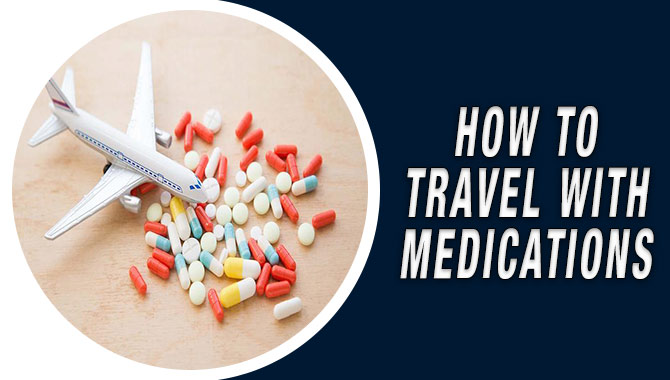
How To Travel With Medications – Step-By-Step Process
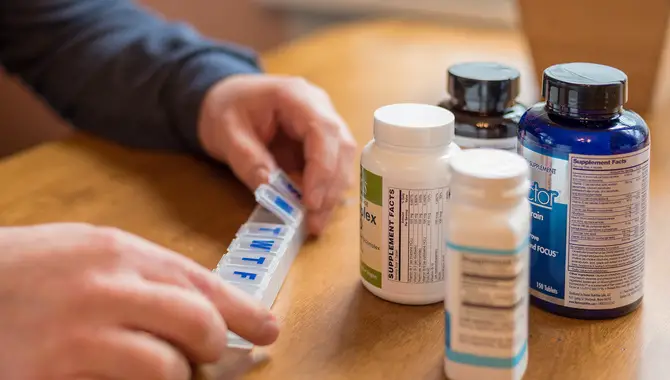
Prior planning and carrying adequate medication for the trip duration can avoid any unforeseen medical emergencies while away from home. Additionally, researching the regulations and restrictions on taking medicines across borders, especially while flying internationally, helps prevent confusion at security checkpoints. Here are complete guidelines on how to travel with medications:
Step 1: Check The Regulations And Requirements:
It’s essential to adhere to regulations when traveling with medications. Each country has different requirements and restrictions that travelers must follow. Pack enough medication and a few extra days’ supplies to avoid any issues while traveling with necessary medicine in case of unexpected delays.
It is also essential to store medication securely in labeled containers easily accessible during Travel. Before leaving for your trip, visit your pharmacist or healthcare provider to ensure you have enough medicine to last throughout your travels. Don’t forget to carry a doctor’s note or prescription as necessary.
Step 2: Consult Your Healthcare Provider:

Before traveling with medications, it’s essential to consult your healthcare provider. They can give you necessary documentation for customs or security screenings, help store and transport your medication safely, and advise on adjusting medication schedules if needed.
This step is crucial for international travelers as different countries have varying medication regulations. Planning can prevent unexpected delays, such as emergency refills or additional screenings at airport security checkpoints.
Step 3: Review Medication Supply:
Before embarking on a journey, one must check their medical supply by reviewing the expiration dates and packing all necessary medicines in labeled containers. Bringing a copy of the prescription along with dosage details is always advisable while traveling.
It can serve as a backup plan in emergencies or loss of medication. Pack enough medicine for the trip duration, including unexpected delays. It is also recommended to consult a pharmacist or healthcare provider on how to store medication for Travel, especially if you are an International traveler or carrying refrigerated medicines.
Step 4: Keep Medications In Their Original Packaging:

When traveling with medication, keeping them in their labeled containers and the original packaging is advisable. Doing so will help prevent confusion or questions at airport security checkpoints since the packaging contains vital information like drug name, dosage, and expiration date.
Also, it’ll be easier to identify which medication is which and when to take them. In an emergency, having the original packaging can provide valuable information for medical treatment purposes. Ensure a sufficient supply of medications for your trip’s duration and additional days in case of unforeseen situations.
Step 5: Carry A Doctor’s Note Or Prescription:
Carrying a doctor’s note or prescription is crucial when traveling with medications. The letter should contain details such as the name of the drug, dosage, and reason for taking it. It is also essential to bring enough medication for the whole trip and more in case of unforeseen situations.
Pack your medicines in labeled containers and their original packaging to avoid any confusion. Consulting your healthcare provider before traveling can help you learn about any precautions you might need to take while carrying your medicine.
Step 6: Divide Medications Between Carry-On And Checked Luggage:
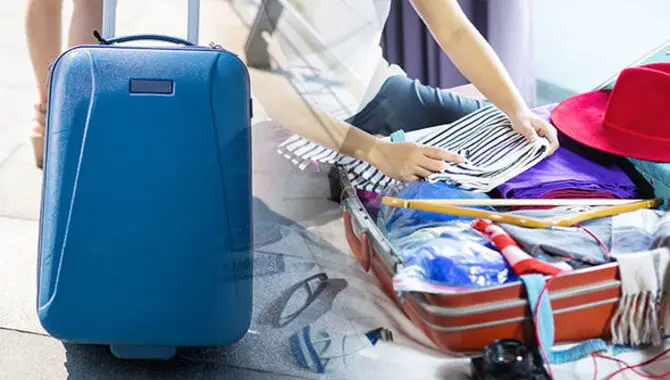
Dividing your necessary medicines between carry-on and checked luggage is crucial while traveling. It ensures easy accessibility of essential medication during and after the flight while packing the non-essential ones in checked baggage. Ensure proper labeling of all medication containers per TSA regulations and carry a refill and a doctor’s note in emergencies.
Additional screening may be required for liquid forms of medication exceeding three ounces or injectable medication; documentation for medical marijuana is also necessary on international Travel. Pack enough medicine for the trip plus excess, just in case, and store them properly per the health care provider’s advice.
Step 7: Organize Medications For Easy Access:
It’s essential to store and organize your medications when traveling correctly. To avoid any confusion during the screening process at the airport security checkpoints, make sure that all of your medications are properly labeled and stored in their original containers with labeled containers.
Organize them in a separate bag or container if you have multiple medications. Don’t forget to carry a copy of your prescription and any necessary medical documents like emergency refills or general information about the medicine you might need during the trip.
Step 8: Pack Medications Securely:
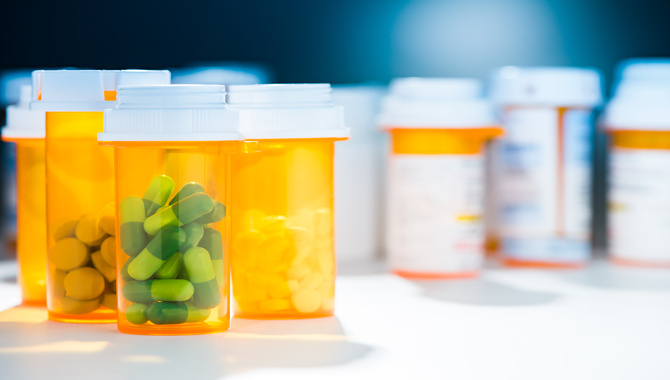
Packaging them securely when traveling with medications is crucial to prevent damage or theft. To do this effectively, keep your medicine in its labeled container and separate any liquid from other items to avoid spills.
It’s recommended that you carry a copy of your prescription or doctor’s note for controlled substances like Adderall as well. Pack extra medication in case of unexpected delays or loss during transit. A pharmacist can also provide information about traveling with prescription medication if needed.
Step 9: Store Medications Properly:
Proper storage of medication is essential while traveling. Store medications in labeled containers and keep them away from extreme temperatures and direct sunlight to ensure their effectiveness and safety. Organize medicines by packing them separately in a container; carrying a copy of prescriptions while traveling internationally is recommended.
Carry an emergency refill and extra supplies during the trip to avoid any unforeseen delay or sudden illness. During airport security checks, always declare liquid medicine or injectable drugs beforehand to prevent additional screening. Furthermore, you can consult a pharmacist regarding regulations or limitations enforced by TSA or destination countries’ authorities.
Step 10: Declare Medications At Security Checkpoints:
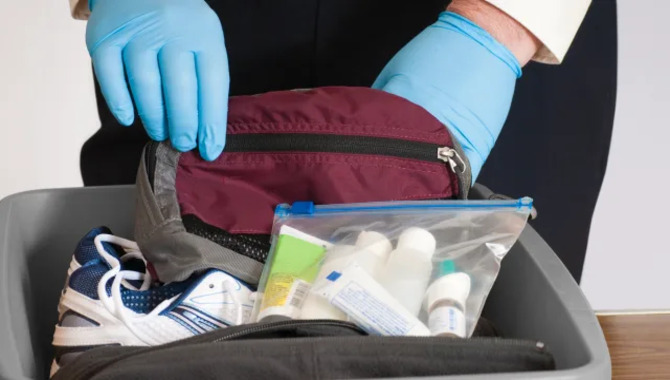
When traveling with medication by air, remember to declare all drugs at the TSA checkpoints to avoid legal issues and possible consequences like flight delays. Researching beforehand is critical as some medicines require additional documentation or restrictions for transportation.
While packing your bags and carrying on luggage, make sure that you store the medicine in its original labeled containers separately from other items. Pack liquid forms of treatment like insulin packs and necessary liquids exceeding the limit of 3 ounces in sealable plastic bags to avoid leakages.
You must also carry a copy of your doctor’s prescription or note for any controlled substances like Adderall or narcotics that might require extra scrutiny.
Common Mistakes To Avoid When Traveling With Medications
Planning is vital when it comes to traveling with prescription medication. When packing your carry-on luggage, keep only necessary liquids in labeled containers. If you have questions about what you can bring on board the plane, contact TSA or your healthcare provider for guidance.
Also, remember to carry a doctor’s note or prescription and declare all medicines at airport security checkpoints. It’s essential to avoid common mistakes like improper medication storage and not having a backup supply or emergency refill. By following these guidelines and being prepared, you can ensure safe travels with your necessary medicine.
Tsa Guidelines For Carry-On Medications
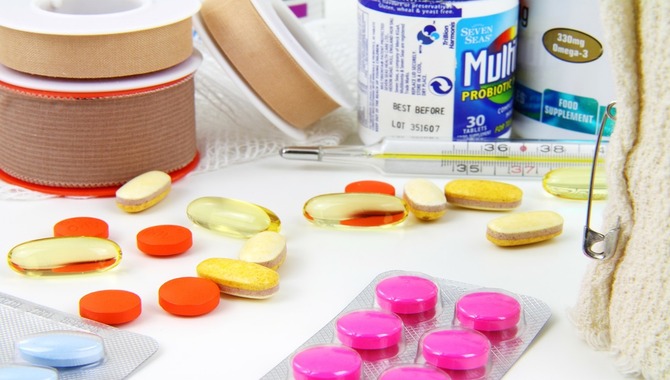
It is crucial to adhere to TSA guidelines when traveling with medication. Keep medicines in labeled containers and pack them in your carry-on luggage. Always keep a doctor’s note or prescription handy. Additionally, research international regulations while carrying medication while flying.
To simplify the screening process at the airport security, make sure that you declare all medically necessary liquids and have only enough medicine required during your trip. Please consult your pharmacist before packing injectable drugs or refrigerated substances, as they might need additional screening.
Conclusion
Traveling with medications can be a stressful experience, but it’s essential to ensure that you have safe travels. Following the guidelines and regulations for packing and carrying drugs is crucial to avoid complications or delays during your journey.
Always consult your healthcare provider before traveling and review your medication supply beforehand. Keep your medications in their original packaging and carry a doctor’s note or prescription. Organize your medications for easy access and pack them securely to avoid breakage or damage.
It’s also important to declare your medications at security checkpoints. We hope the above outline of how to travel with medications will be very helpful for your safe travel.
Frequently Asked Questions
What Are The Legal Requirements For Traveling With Prescription Medications?
Before traveling with prescription medications, research the legal requirements of your destination, as some countries have strict regulations. Keep medicines in original packaging and bring a copy of the prescription or doctor’s note.
Are There Any Additional Precautions I Should Take When Traveling Internationally With Medications?
When traveling internationally with medications, research the laws and regulations of your destination. Bring a letter from your doctor explaining your need for the drug, carry them in their original packaging with labeled prescriptions, and pack extra doses in case of emergencies or loss.
What Documents Do I Need To Travel With Medications Internationally?
When traveling with medication internationally, bring a doctor’s note with details of the drug, dosage, and reason for use. Please keep a copy of your prescription in its original container.
What Should I Do If I Run Out Of Medication While Traveling?
If you run out of medication while traveling, locate a pharmacy or medical facility immediately. In a foreign country, check local laws and consult your doctor. Carry copies of prescriptions and medical documents.
What Should I Do If I Lose Or Run Out Of Medication While Traveling?
If you lose or run out of medication while traveling, attempt to obtain a refill from a local pharmacy. Contact your doctor for advice if this is not possible. Keep a copy of your prescription and medication information while traveling.


